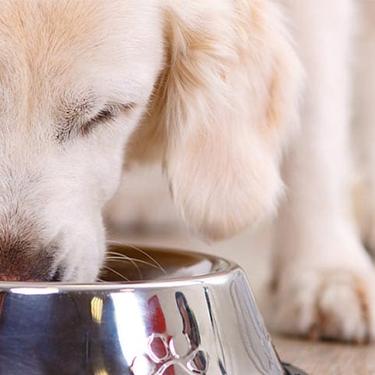
-
Find the right food for your pet
Take this quiz to see which food may be the best for your furry friend.
Find the right food for your pet
Take this quiz to see which food may be the best for your furry friend.
Featured products
 Adult 7+ Perfect Digestion Chicken, Whole Oats & Brown Rice Recipe Dog Food
Adult 7+ Perfect Digestion Chicken, Whole Oats & Brown Rice Recipe Dog FoodScience Diet's breakthrough nutrition supports ultimate digestive well-being & healthy microbiome for dogs age 7+
Shop Now Adult Healthy Cuisine Roasted Chicken, Carrots & Spinach Stew Dog Food
Adult Healthy Cuisine Roasted Chicken, Carrots & Spinach Stew Dog FoodDelicious roasted chicken paired with tender vegetables in a succulent stew
Shop Now Small & Mini Savory Stew with Chicken & Vegetables Dog Food
Small & Mini Savory Stew with Chicken & Vegetables Dog FoodA delicious complement to the nutrition of Science Diet Small & Mini 7+ dog food
Shop NowFeatured products
 Adult 7+ Tender Tuna Dinner Cat Food
Adult 7+ Tender Tuna Dinner Cat FoodWith delicious chunks in a decadent gravy
Shop Now Adult Savory Entrée Can Variety Pack Cat Food
Adult Savory Entrée Can Variety Pack Cat FoodPrecisely balanced nutrition with the delicious taste of savory minced chicken to help fuel the energy needs of cats during the prime of their life
Shop Now Adult 7+ Senior Vitality Chicken & Vegetable Stew Cat Food
Adult 7+ Senior Vitality Chicken & Vegetable Stew Cat FoodImproves Everyday Ability to Get Up & Go
Shop Now -
Dog
- Dog Tips & Articles
-
Health Category
- Weight
- Food & Environmental Sensitivities
- Urinary
- Digestive
- Joint
- Kidney
-
Life Stage
- Puppy Nutrition
- Adult Nutrition
- Senior Nutrition
Cat
- Cat Tips & Articles
-
Health Category
- Weight
- Skin & Food Sensitivities
- Urinary
- Digestive
- Kidney
-
Life Stage
- Kitten Nutrition
- Adult Nutrition
Featured articles
 Does My Pet Hate Me?
Does My Pet Hate Me?Learn tips for bonding with your pet if you've ever thought, 'My dog doesn't like me, or 'Why do I have a standoffish cat?'
Read More Why Are Dogs and Cats So Cute?
Why Are Dogs and Cats So Cute?If waggy puppy dog tails and furry kitten yawns make you swoon, you're not alone. Why are cats so cute? And, dogs too! Let's find out!
Read More Do Dogs and Cats have Belly Buttons?
Do Dogs and Cats have Belly Buttons?Learn whether cats & dogs have belly buttons like humans, what the function is, and if there are any health concerns associated with it.
Read More -


It's that time of the year when sniffles turn into sneezes and a tickle in the throat becomes a persistent cough. You'll do anything to keep your family healthy, including your pup. So, now maybe you are wondering, "Can a dog get a cold?" If you're feeling under the weather yourself, the lingering thoughts of "Can dogs get the flu from humans like me?" will stress you out even further. Of course, you love your pet, and you want to keep him healthy, but do you need to keep your dog away from you as you recover? Here's a quick overview of whether a human cold or the flu can get your pup sick, as well as what you can do to make him feel better.
Can a Dog Get a Cold from a Human?
Achoo! Are you sneezing? Do you have a stuffy nose or a sore throat? In humans, colds appear after a person comes in contact with another human infected with a virus. Other symptoms, besides sneezing, a sore throat, or a stuffy nose, include watery eyes or excess mucus in the nose and throat. So, can a dog get a cold from you?
Here's some great news: If you're sick and your pup wants to give you a smooch and cuddle to raise your spirits, you don't have to turn him away. Some infections, viruses, or even bacteria are species-specific, which is why you don't need to worry about sharing a common cold. A human cold can only affect humans. It cannot be transmitted to animals, says PetMD.
Can a dog get a cold from another dog? Unfortunately, the answer to that is yes. While you may not be able to pass your cold to your pet, that doesn't mean another dog's sneezing can't get your pup sick. In fact, many of your dog's symptoms will mimic a human's. According to PetMD, "While there are differences in the types of viruses that infect humans versus dogs, the symptoms are basically the same: sneezing, coughing, runny or stuffy nose, watery eyes." There are many types of viruses that dogs can spread to each other. Let's take a look at one of the most common dog colds:
Kennel Cough
A highly contagious respiratory disease, kennel cough is often contracted when dogs are boarded or spend time in a place with numerous dogs, such as a dog show or training class. The worst part is your dog doesn't even need to come into direct contact with an infected dog. The virus can live on items, such as on water bowls or on favorite toys the dog may have left some saliva. According to Vetstreet, "A blaring, hacking cough like a goose honk is the most common sign [of kennel cough]. Affected dogs will often retch and gag, as if trying to dislodge something from their throats." Dogs that come in contact with kennel cough will usually show symptoms within four to ten days. Treatment includes anything from watching and waiting to a prescription of antibiotics.


Tasty Tips
Can Dogs Get the Flu from Humans?
While the human flu shares similar symptoms with the common cold, if your body is feeling achy and you have a fever, there's a chance you have a more serious condition–influenza. The flu virus is spread from one person to another person, so make sure to cover your coughs and sneezes. Unlike a common cold, which resolves rather quickly, the flu lasts longer and can develop into more serious conditions, such as pneumonia, says the American Lung Association.
You'll be happy to know that similar to the common cold, your dog won't get the flu if a human member of his household is sick. However, there is a canine-specific influenza you should be aware of.
Canine Influenza
The dog flu, also known as canine influenza, is a respiratory infection like the human condition. According to the American Veterinary Medical Association (AVMA), "The first strain reported in the United States, beginning in 2004, was an H3N8 influenza A virus ... In 2015, an outbreak that started in Chicago was caused by a separate canine influenza virus, H3N2." Symptoms of the dog flu are similar to the human flu. Your dog may experience a lingering cough that lasts anywhere from ten to thirty days. He may begin sneezing, become feverish, or discharge may appear from your dog's eyes or nose. Your pet will likely be prescribed an antibiotic or other medicine to treat the canine influenza. Be aware: There are necessary steps to take to ensure other animals in your home do not become ill as well. AVMA says, "Dogs with canine influenza should be isolated to prevent transmission of the virus to other dogs or, in the case of H3N2, cats."
A Trip to the Vet
You obviously want to protect your dog just like you'd protect your human children. However, if your pup is feeling under the weather, you may not know how to best take care of him. Taking care of a sick dog is similar to taking care of an ill child.
First, if you suspect your dog is sick in any way, contact his veterinarian for advice on how to proceed. Sick animals should always be examined by a vet to determine the cause and begin a treatment. One recommendation your vet will most likely share with you is for your dog to get plenty of rest. Rest is vital to your pup's recovery. This is something he probably won't have much issue with as he won't feel great, but it is something that should be known to the rest of the household, especially children. Until he is feeling better he won't feel like playing or going on walks. Luckily, since the virus doesn't pass from dogs to humans you can give him all the love and care he needs to know you're there for him to help him get better. Though your pet might not feel well, it's important to keep him hydrated, too. So, keep his water bowl full and encourage him to drink.
If your dog spends time in a doggy day care or will need to be boarded in the near future, work with your vet and the boarder to be sure your pet is healthy enough to be around other animals. You wouldn't want a sick pet intentionally coming into contact with your healthy dog, so it's important to help protect other dogs if your pup is ill. This also means no afternoon visits to the dog park.
With a little rest, relaxation, healthy meals, lots of water, and maybe some medicine, your dog will be back to his regular, playful self in no time!


Erin Ollila believes in the power of words and how a message can inform—and even transform—its intended audience. Her writing can be found all over the internet and in print, and includes interviews, ghostwriting, blog posts, and creative nonfiction. Erin is a geek for SEO and all things social media. She graduated from Fairfield University with an M.F.A. in Creative Writing. Reach out to her on Twitter @ReinventingErin or learn more about her at http://erinollila.com.
Related products
Related articles

Learn the the dangers of feeding your dog chocolate, which types are most dangerous, and what to do if you discover that they have consumed chocolate.

Learn how today's wet dog food blends have gotten a face lift, and how you'll provide your dog the nutrition he needs in the form he loves.

Proper nutrition for your pregnant or nursing dog is vital to her and her puppy's health. Learn what you should do provide her with the proper nutrients.

Learn about choosing the right dog food to help ensure your adult dog will receive the correct balance of nutrition.

Put your dog on a diet without them knowing
Our low calorie formula helps you control your dog's weight. It's packed with high-quality protein for building lean muscles, and made with purposeful ingredients for a flavorful, nutritious meal. Clinically proven antioxidants, Vitamin C+E, help promote a healthy immune system.
Put your dog on a diet without them knowing
Our low calorie formula helps you control your dog's weight. It's packed with high-quality protein for building lean muscles, and made with purposeful ingredients for a flavorful, nutritious meal. Clinically proven antioxidants, Vitamin C+E, help promote a healthy immune system.


